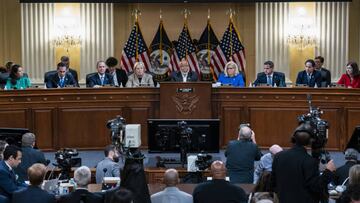What are the similarities between the Jan. 6 attack on the US Capitol hearings and Trump’s impeachment proceedings?
Eighteen months have passed since the US Capitol was attacked; the Jan. 6 House Select Committee will lay out the key facts for the American people to see.

Former President Trump had the disgrace of being the first person to hold the highest office in the United States to be impeached twice. Although both times he was acquitted by his Republican party in the Senate, the second time around saw a record number of his colleagues turn against him.
The House of Representatives impeached him for a second time for his part in whipping up a mob that attacked the US Capitol. The insurrectionists that day were trying to stop the peaceful transfer of power for the first time in American history by preventing Congress from certifying President Joe Biden’s electoral win.
Eighteen months later, and after over ten months of evidence gathering, the House Select Committee to Investigate the January 6th is presenting its findings to the American people. Although the proceedings will have no direct recourse on the former President, they plan to lay out the key facts so that the Justice Department can hold Trump and those that plotted with him to account.
Also see:
- First January 6th Congressional hearing
- What did Ivanka Trump say in her video testimony at the hearing?
- Who is officer Caroline Edwards and what did she testify in the January 6 Capitol attack hearing?
- Michigan GOP gubernatorial candidate Ryan Kelley arrested
- Who are the Proud Boys and the Oath Keepers?
The House January 6th hearings are different from the impeachment proceedings
Trump’s second impeachment trial took place over the course of four days in February 2021, just a matter of weeks after the US Capitol was desecrated. The House prosecutors relied heavily on video of the assault on Congress and the Trump’s speech at the “Stop the Steal” rally at the Ellipse prior.
However, no witnesses were called before judgement was passed over worries that it would drag out the proceedings taking valuable time away from confirming the numerous open posts of the recently inaugurated Biden administration.
The House approved a single charge against Trump, with 10 Republicans voting with Democrats, of “inciting violence against the government of the United States.” In the Senate trial both the House prosecutors and Trump’s lawyers were given equal time to present their case before the jury of 100 Senators. All 50 Democratic Senators and seven Republicans voted to convict Trump, but that was still 10 GOP votes shy of the number needed.
"The oath we swear today—that nearly every person who works for the United States Government swears—has its roots in the Civil War... That oath was put to the test on January 6th, 2021."
— January 6th Committee (@January6thCmte) June 10, 2022
-Chair @BennieGThompson pic.twitter.com/8qLeYBqmU9
The January 6th hearings will “lay out the key facts” of the mountains of evidence gathered
Again, in the January 6th public hearings the focus is on the former president’s role on that infamous day. However, this time the House Select Committee has had over 10 months to collect over 125,000 documents and testimony from more than 1,000 people, including from his family and those inside the White House close to the former president.
The hearings are not a trial, but a divulgation of that information boiled down “into a consumable narrative, to lay out the key facts” for the American people to have an opportunity to view. The panel intends to demonstrate how efforts were coordinated over the 65-day period from the time Trump falsely declared he won the 2020 election until 6 January to overturn his defeat.
In the first hearings, the select committee showed video of people close to Trump informing him that he had lost the election and that there was absolutely no basis for claiming election fraud. Much like how prosecutors present a case in court to prove the guilt of one charged, they will show that Trump and his collaborators had formulated a plan to disrupt the peaceful transfer of power and carried it out. That one of the darkest days in American history wasn’t some protest that got out of hand, but an integral part in the last-ditch effort to keep Trump in office through a coup.
"Those who invaded our Capitol and battled law enforcement for hours were motivated by what President Trump had told them.
— January 6th Committee (@January6thCmte) June 10, 2022
President Trump summoned the mob, assembled the mob and lit the flame of this attack." -Vice Chair @RepLizCheney pic.twitter.com/GOeynxo1Tm
The evidence against Trump will be presented over at least six hearings
The information gathered will be presented over at least six hearings, bookended by two prime-time broadcasts, the first of which was shown on all the major networks except Fox News. To keep viewers from channel surfing to view the first hour of hearings on 9 June, the Tucker Carlson show was broadcast for an hour without commercial breaks according to the left-leaning group Media Matters, which tracks conservative media.
Related stories
The Guardian published a draft schedule of the hearings, but it has not been formalized though. Committee members have repeated in interviews that the list of witnesses and the number of hearings could change.
The next meeting will be held on 13 June in the morning at 10 am ET and run between 2 and 2.5 hours, as will the following three that are expected 15, 16 and 21 June. The final prime-time hearing could be broadcast 23 June.


